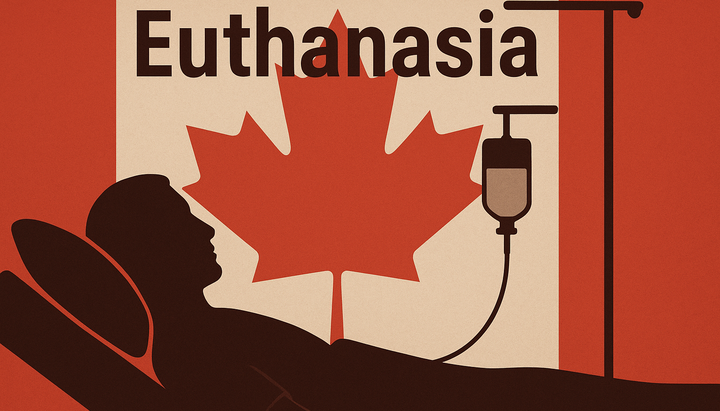Every 20th death in Canada is due to euthanasia, media

The MAID program now covers more cases than Alzheimer's disease and diabetes combined.
Canada has become the world leader in the growth rate of euthanasia: currently, the medical assistance in dying (MAID) program accounts for every 20th death in the country, reports American magazine The Atlantic.
According to the publication, MAID now surpasses Alzheimer's disease and diabetes combined in the number of cases. In the province of Quebec, more than 7% of all deaths are due to euthanasia – the highest rate in the world among all jurisdictions where assistance in dying is permitted.
When the Canadian Parliament legalized euthanasia in 2016, the country launched an "open-ended medical experiment". Initially, MAID was limited to severely ill patients who were already near death, but the law was later expanded to include people suffering from serious illnesses but not in the terminal stage. In two years, the program will be available to those suffering only from mental disorders. The Parliament also recommended granting access to minors.
As of 2023, about 60,300 Canadians have received legal assistance in dying from doctors. "I have two or three cases every week, and this number continues to grow each year," said family doctor Claude Rivard from a Montreal suburb, who has conducted over 600 euthanasia procedures.
The world's fastest-growing euthanasia system is based on the concept of patient autonomy. However, in some cases, unforeseen consequences have arisen: Canadians who cannot afford treatment for their illness are turning to doctors to end their lives.
The "Track 2" MAID, introduced in 2021 for people whose death is not "reasonably foreseeable," has become particularly controversial. In 2023, it accounted for 622 deaths – just over 4% of the total, compared to 3.5% in 2022.
Critics of the program point to cases where patients chose euthanasia due to socio-economic issues rather than medical indications.
Normond Meunier, a paralyzed man from Quebec, sought euthanasia after four days on a stretcher in the emergency department when he couldn't get a suitable mattress, leading to painful bedsores. "I don't want to be a burden," he said before the procedure.
According to statistics, nearly half of all Canadians who died from euthanasia considered themselves a burden to family and friends. The UN Committee on the Rights of Persons with Disabilities formally called for the abolition of "Track 2" MAID in Canada in March of this year, arguing that the federal government has "radically altered" the program's foundation based on "negative, discriminatory perceptions of the quality and value" of the lives of people with disabilities.
Canadian authorities plan further expansion of the program. From 2027, MAID will be available to people suffering only from mental disorders. The parliamentary committee also recommended granting access to "mature minors." Additionally, the possibility of "advance requests" is being considered – where people can agree to receive MAID in the future when their illness deprives them of the ability to make decisions.
In the province of Quebec, a law has already been passed to fulfill advance requests for euthanasia for patients with cognitive disorders, such as Alzheimer's disease. More than 100 such requests have already been submitted, and at least one has been fulfilled.
The initial forecasts by the Canadian government that the MAID rate would stabilize at 2% of total deaths and then 4% by 2033 proved inaccurate. Canada exceeded the latter figure 11 years ahead of schedule, after which officials simply stopped publishing forecasts.
"How can we turn away and ignore the pleas of suffering Canadians?" said former Liberal Senate leader James Cowan, explaining the logic of expanding the program.
Earlier, the UOJ reported that in New Zealand, the number of euthanasia cases increased by almost 40 percent in a year.











